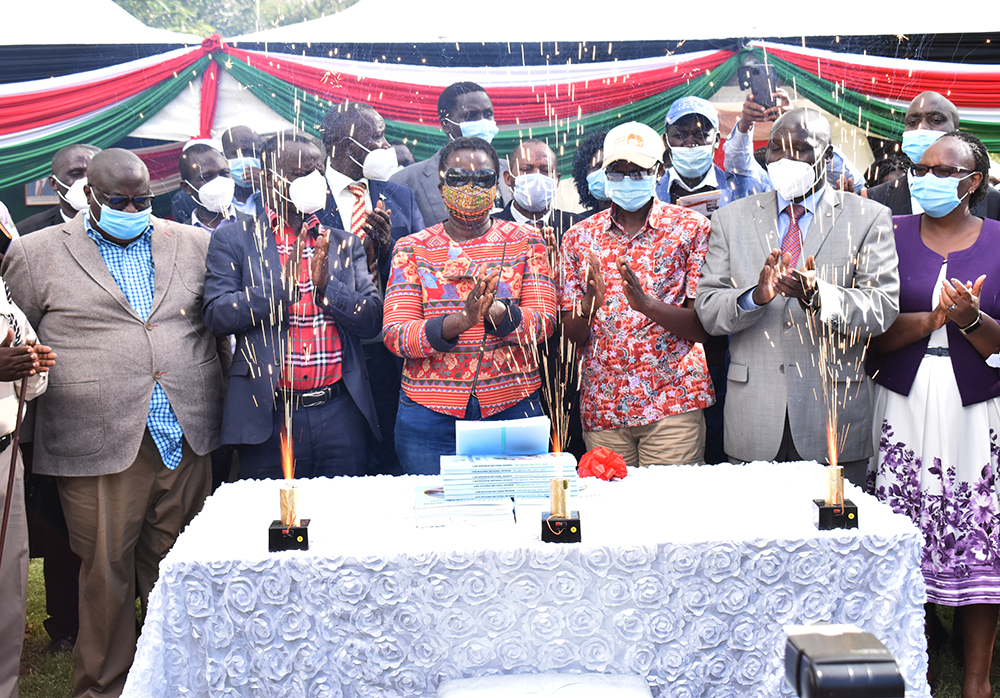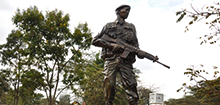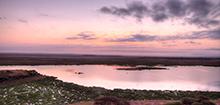
Date Published:
The Chief Administrative Secretary in the Ministry of Tourism and Wildlife IG (Rtd.) Joseph Boinnet launched the much-awaited Management Plan for Lake Bogoria National Reserve November 5, 2020, in Baringo County. The launch was preceded by the commemoration of the 10th anniversary of the Nagoya Protocol at Lake Bogoria Spa Resort in Baringo County, which commenced from 3 to 6 November.
Speaking on behalf of KWS’ Director General, the Director of Biodiversity Research and Planning Dr. Patrick Omondi said that Kenya joined the world in celebrating the 10th anniversary of the Nagoya Protocol; an international, legally binding instrument that was negotiated by parties to the Convention on Biological Diversity (CBD) and was adopted in Nagoya, Japan on October 29, 2010. It implements the third objective of the CBD on the fair and equitable sharing of benefits accruing from access to, and utilization of biological resources and associated traditional knowledge.
Dr. Omondi stated that KWS is the principal advisor to the government on matters pertaining to wildlife policy matters. As such, KWS is mandated by the Constitution, Wildlife Conservation and Management Act, 2013, (WCMA) and other relevant legislation - including National Commission for Science, Technology and Innovation (NACOSTI), Environmental Management and Coordination Act (EMCA) - to manage Kenya’s wildlife resources on behalf of her citizenry.
He explained that Lake Bogoria National Reserve ecosystem is one of few tourist sites offering unique products such as hot springs, in addition to scenic landscapes and welcoming local communities. Dr. Omondi lauded communities which cohabit peacefully with Kenya’s wildlife.
He said that cases of bio piracy and illegal trade have been reported in Baringo, for example, aloe gum, sandal wood trade, extremophiles bio piracy from Lake Bogoria, which have been used for industrial feedstock abroad. KWS has been able to implement the instrument of Nagoya Protocols to ensure equitable sharing of resources since the protocol was ratified in 2014.
The Director said that during the implementation of the protocol, new challenges have emerged, particularly on approval permitting and charging research fees. KWS is looking into an efficient online system of applying for a research permit. Dr. Omondi said that Covid19 has supressed KWS tourism revenue streams by more than 95%, saying other revenue generation streams must therefore be sought.
KWS is collaborating with several partners among them UNDP global ABS project and GIZ ABS initiative on implementation of various activities in line with Nagoya Protocol. Other partnerships include with the snake bite research and innovation centre, to ensure that the research that emerges is used to efficiently manage wildlife in Kenya.
UNEP regional representative for Africa Dr. Juliette Biao congratulated Kenya for making broad steps in the domestication of the Nagoya Protocol both at national and county levels. She praised the Soda Lake project - which focuses on actualizing the benefits from genetic resources in Kenya - as being one of the few in the world where practical aspects of embracing the Nagoya Protocols are being done.
Principal Secretary in the State Department of Wildlife Prof. Fred Segor acknowledged Baringo Governor and his government, the Soda Lakes project partnership through GEF through UNEP, for the development of the Lake Bogoria Management Plan and for supporting the launch. Other partners include GIZ ABS initiative, UNDP ABS project and The Nature Conservancy (TNC).
Prof. Segor said Nagoya protocol requires the establishment of domestic measures, with clear legal clarity, certainty and procedures guidelines for both users and providers. He said that wildlife have as much right to live as humans, advising attendees to follow proper channels to claim for compensation whenever they were affected by human-wildlife conflict.
Chief Administrative Secretary in the Ministry of Tourism and Wildlife, IG (Rtd.) Joseph Boinnet said that part of Kenya’s celebration of the 10th anniversary of the Nagoya Protocol included the launch of the model ABS-based Lake Bogoria National Reserve Management Plan.
The CAS said that Baringo is the only county to have benefitted from gene trade, where royalties received supported several students around Lake Bogoria including support of the Endorois cultural centre.
He said that Kenya must realize and maximize benefits from our heritage, recommending that county governments review their management plans to incorporate elements of access and benefit sharing using the Baringo model.
He lamented the destructive heavy rains pounding the county, lauding the scientists who have taken the initiative to find out the cause of this phenomenon with a view to advising government on what needs to be done. Boinnet paid tribute to the late honourable John Michuki, a former Minister for Environment for the sacrifices he made whilst leading the African negotiators in Nagoya, Japan.
The Lake Bogoria Management Plan was developed under the Soda Lakes project and is a partial response to enhance governance towards effective access and utilization of biodiversity through creation of effective decision-making structures and benefits-sharing.





